What Museveni and Egypt president discussed
On his first visit to Uganda, President Abdel Fattah el-Sisi held talks with his host President Museveni in Entebbe.
ENTEBBE - President Yoweri Museveni hosted his Egyptian counterpart Abdel Fattah el- Sisi on Sunday and held talks on a wide range of issues, including security and trade.
It was el-Sisi's first visit to Uganda since he assumed office two years ago.
The two leaders first held a tete-a-tete session of talks that was followed by an expanded meeting, including the two countries' officials.
Talks tackled promoting bilateral co-operation, increasing trade exchange and setting up joint projects in Uganda. The two sides also discussed a number of African issues of mutual interest and ways of enhancing security and stability in the continent, and finding political settlement to the crises in African nations.
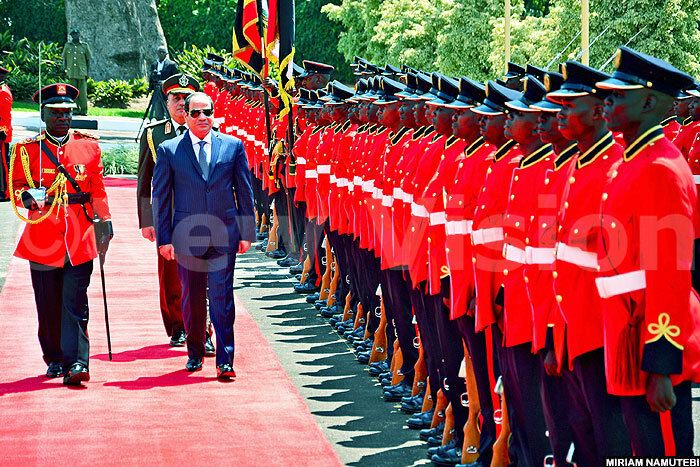
President El-Sissi inspects a guard of honour at State House Entebbe
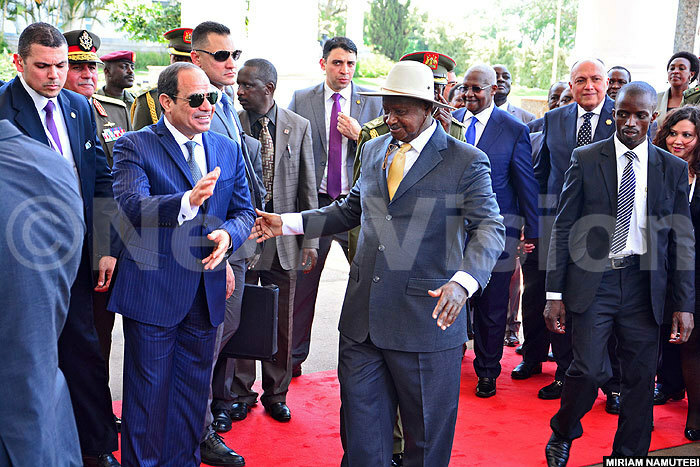
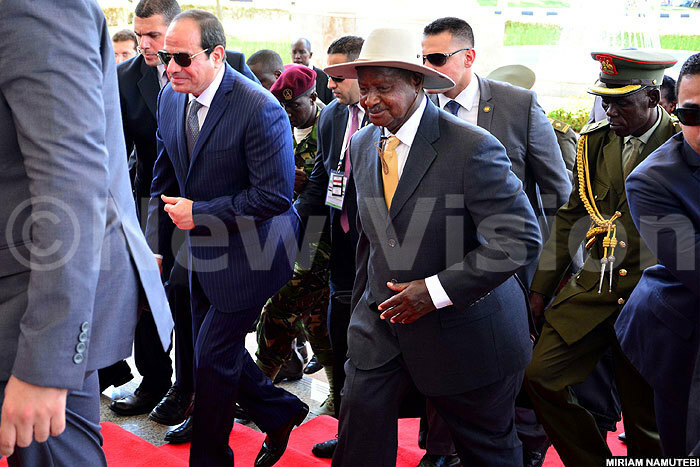
During a joint press conference at State House, Entebbe, President Museveni said he had good and deep discussions about bilateral and regional issues with president el-Sisi.
"Uganda and Egypt have got common stance on many international issues, especially on the issue of terrorism. We oppose terrorism; we oppose interfering in other people's internal affairs. We have had detailed discussions on this. We have agreed to immunise our continent from external meddling," Museveni said.
The two leaders, however, noted that the volume of trade between the two countries is still small. Egyptian investors in Uganda include Cairo International Bank, EgyptAir, and Mantrac Uganda.
The Egyptian Arab Contractors Company is executing several development projects in Uganda, with a total value of $25m, according to Egyptian media reports.
Museveni said there is a huge market in Egypt for food products and urged Ugandans to take advantage of this market.
"They (Egyptians) need beef, beans, fruits, fish — everything. However, you should not worry because now there is a permanent joint commission that has not been meeting for a long time, which is now going to meet. When you meet, involve business people and ask what you can buy from one another."
The President said Uganda is not a landlocked country because it has got a highway all the way to the Mediterranean Sea given by God.
"However, the history of problems in south and northern Sudan has blocked that route. We are looking forward to the hope that there will be peace in south and northern Sudan," Museveni remarked.
The two leaders, after their brief statements at the joint press conference, declined to take any questions on account of time.
Museveni wondered why el-Sisi was the first Egyptian president to pay an official visit to Uganda, yet Uganda is the source of River Nile.
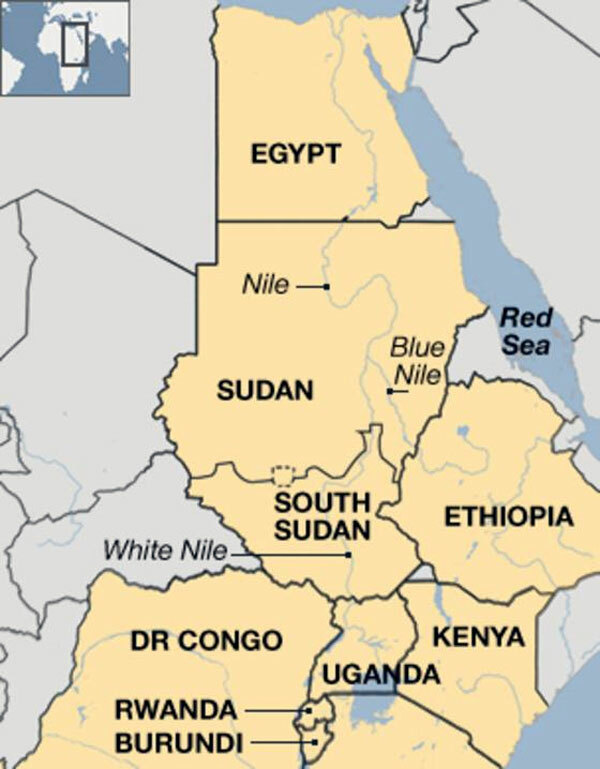
El-Sisi speaks out
President el-Sisi commended Museveni for his role in bringing peace to Uganda and the African continent as a whole.
He noted that there is need to address regional challenges such as terrorism and extremism, which he said threaten the stability of East Africa, North Africa and Africa as a continent.
"Terrorism is threatening the sovereignty of countries. We need to stop the plague of extremism and make sure it does not have a negative impact on our development."
On the issue of ensuring stability in Africa, el-Sisi said Egypt supports the work of the transitional government of South Sudan and would desire to be part of the regional protection force.
Museveni's comments
Museveni urged Egypt to resist sectarianism, which he said is responsible for the rise of extremism in the world.
"When President Mohammad Morsi came here, I told him his project of Muslim Brotherhood was dangerous for Egypt. In Uganda, we do not look at religion and tribe, but citizenship."
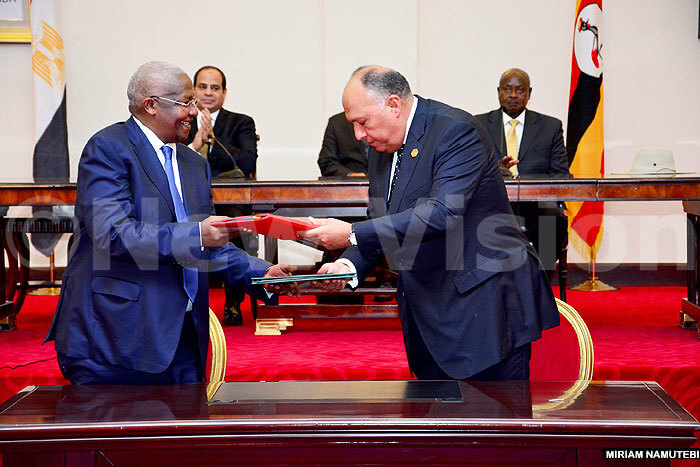
Uganda's foreign affairs minister Sam Kutesa (left) exchanges signed documents of an MOU with his Egyptian counterpart Sameh Shoukry as Presidents El-Sissi and Museveni look on in the background
In 2013, Egypt's first democratically elected president, Morsi, was ousted by the military led by Gen. el-Sisi, after only one year in power. El-Sisi was later elected president in May 2014.
Museveni welcomed Egypt's decision to provide a protection force in South Sudan, observing that unlike Uganda, Egypt does not share a border with South Sudan and would, therefore, not be accused of bias in the situation.
The President called upon the Egyptian government to discourage the United Nations Security Council's policy of putting sanctions on South Sudan. He said sanctions cause a vacuum in leadership.
Regarding the River Nile, Museveni said Uganda would take strict measures to ensure the conservation of River Nile so that Egypt, which relies on it solely for water supply, would not be affected.
"The problem of the Nile is too much agriculture. The Chinese brought the culture of growing paddy rice in the wetlands, which wetlands need to be left alone and used sustainably," he said.
Museveni added that the Nile Basin countries should also develop a highway along the Nile, in order to enable land locked countries such as Uganda, South Sudan and Ethiopia reduce the distance to Europe and to the Port of Alexandria.
The Ugandan leader encouraged Egyptian investors to build warehouses, so that Egyptian products do not only appear on the Ugandan market during the trade fairs.
President el-Sisi said Egypt will collaborate with Uganda in the field of irrigation, livestock farming and electricity. The two countries signed a memorandum of understanding on political consultations.
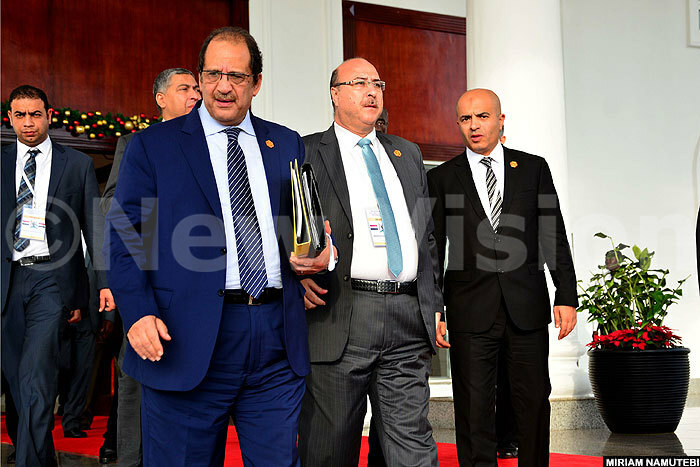
Some of the Egyptian delegates that traveled with President Abdel Fattah El-Sissi leave after bilateral talks between Uganda and Egypt at State House Entebbe
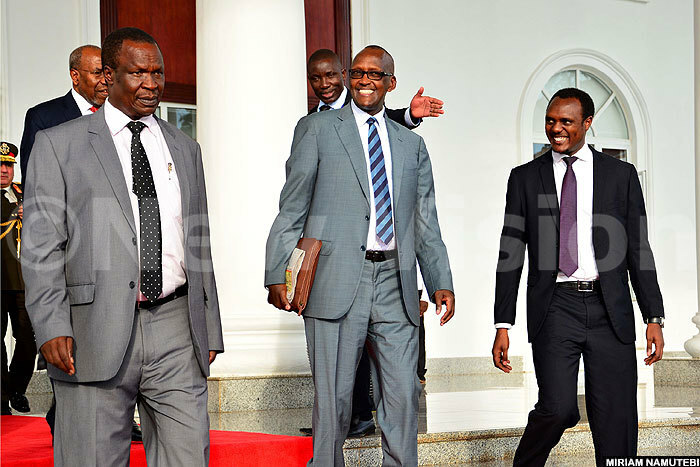
Ministers D'Ujanga Simon (state for energy) and Henry Tumukunde (security) leave after the bilateral talks
There has been dispute among the Nile Basin countries over the new Co-operative Framework Agreement, also known as the Entebbe agreement, which is meant to replace a 1929 agreement that awarded Egypt and Sudan the majority use of the Nile River.
Uganda, Rwanda, Tanzania, Kenya, Burundi and Ethiopia have signed the new agreement.
Egypt and Sudan, however, have refused to sign the agreement in its current form, saying it would affect their historical shares of the river's water.